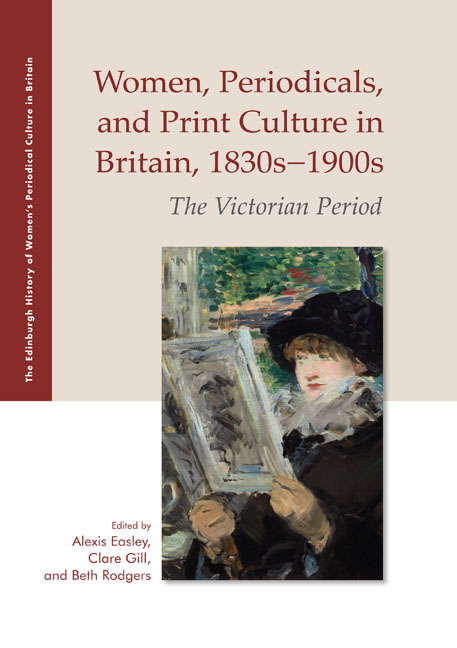Book contents
- Frontmatter
- Contents
- List of Illustrations
- Acknowledgments
- Introduction: Women, Periodicals, and Print Culture in the Victorian Period
- Part I (Re)Imagining Domestic Life
- Part II Constructing Modern Girls and Young Women
- Part III Women and Visual Culture
- Part IV Making Space for Women
- Part V Constructing Women Readers and Writers
- Constructing Women Readers and Writers: Introduction
- 24 ‘Afford[ing] me a Place’: Recovering Women Poets in Blackwood's Edinburgh Magazine, 1827–1835
- 25 Constructing the Mass-Market Woman Reader and Writer: Eliza Cook and the Weekly Dispatch, 1836–1850
- 26 Elizabeth Gaskell and the Habit of Serialisation
- 27 Gender and Genre in Reviews of the Theological Novel
- 28 Reading Poet Amy Levy through Victorian Newspapers
- 29 ‘I simply write it to order’: L. T. Meade, Sisters of Sherlock, and the Strand Magazine
- Part VI Intervening in Political Debates
- Notes on Contributors
- Index
- Plate section
26 - Elizabeth Gaskell and the Habit of Serialisation
from Part V - Constructing Women Readers and Writers
Published online by Cambridge University Press: 25 October 2019
- Frontmatter
- Contents
- List of Illustrations
- Acknowledgments
- Introduction: Women, Periodicals, and Print Culture in the Victorian Period
- Part I (Re)Imagining Domestic Life
- Part II Constructing Modern Girls and Young Women
- Part III Women and Visual Culture
- Part IV Making Space for Women
- Part V Constructing Women Readers and Writers
- Constructing Women Readers and Writers: Introduction
- 24 ‘Afford[ing] me a Place’: Recovering Women Poets in Blackwood's Edinburgh Magazine, 1827–1835
- 25 Constructing the Mass-Market Woman Reader and Writer: Eliza Cook and the Weekly Dispatch, 1836–1850
- 26 Elizabeth Gaskell and the Habit of Serialisation
- 27 Gender and Genre in Reviews of the Theological Novel
- 28 Reading Poet Amy Levy through Victorian Newspapers
- 29 ‘I simply write it to order’: L. T. Meade, Sisters of Sherlock, and the Strand Magazine
- Part VI Intervening in Political Debates
- Notes on Contributors
- Index
- Plate section
Summary
ELIZABETH GASKELL USED serial publication to accommodate but also to challenge the editorial perspectives of those who published her work. This chapter demonstrates how the structure and style of her novels North and South and Wives and Daughters were formed in response to their periodical contexts. This is accomplished by rereading the volume edition of North and South in relation to the serial edition of the novel published in Household Words and by re-situating Wives and Daughters within the interwoven fictional and non-fictional content of Cornhill Magazine. The chapter also revisits letters written by Gaskell while she was working on the two novels, demonstrating how she envisioned the serials in relation to their specific periodical contexts and to the ongoing periodical series. Andrew Sanders suggests that Cornhill Magazine was an ‘agreeable vehicle’ for Wives and Daughters but that writing for Household Words provided the real training for Gaskell as a serial novelist (2000: 57). This chapter proposes to re-examine this view by setting Dickens's editorial influence over North and South against the novel's structure revisited for the volume edition. The later novel, Wives and Daughters, was not just shaped for a space ‘agreeable’ to Gaskell but was developed as a response to her own reading of the content of Cornhill Magazine. Even as she struggled with both the practical and artistic demands of the serial format, Gaskell understood and responded to periodical publishing conventions.
Periodicals were important sites for the consumption of the novel in the midnineteenth century. Dickens's part-work serialisations elevated the status of the serial novel, and by the 1860s, high-quality monthlies such as the Cornhill acted as fictionwriting vehicles that created a recognisable brand and format, offering a miscellany of fictional and non-fictional content. The presentation of Gaskell's two serialised novels should therefore take account of the original publishing context chosen by the author, managed by editors, and consumed by readers. Any reading of that context should also take account of the role of serialisation in the life of a periodical. As I have noted elsewhere, the station or placement of the serial within a magazine issue played a significant role in its composition and consumption (Delafield 2015: 73–86).
- Type
- Chapter
- Information
- Women, Periodicals and Print Culture in Britain, 1830s–1900sThe Victorian Period, pp. 429 - 441Publisher: Edinburgh University PressPrint publication year: 2019



